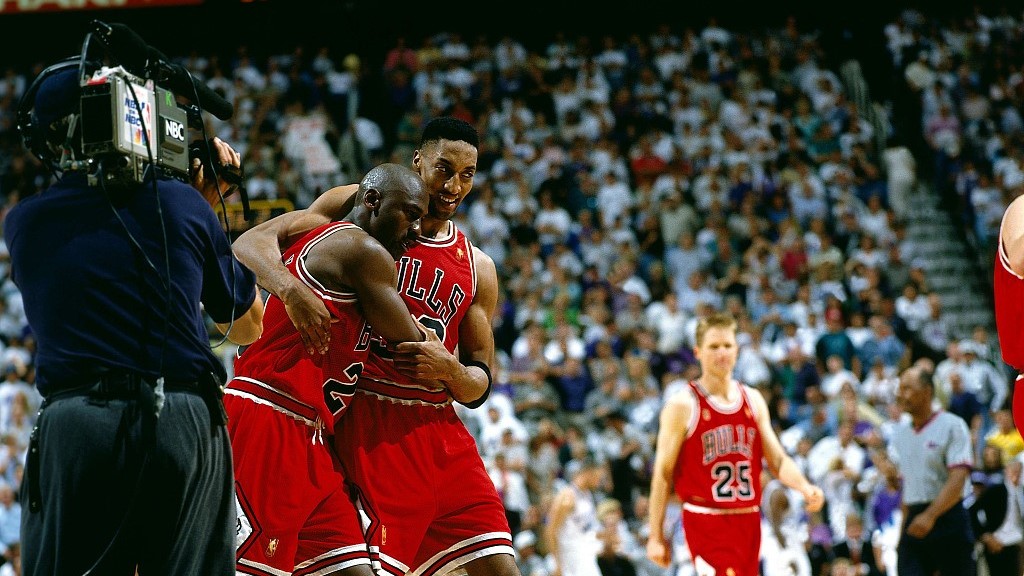
Michael Jordan #23 of the Chicago Bulls leaves the court with the help of his teammate Scottie Pippen #33 after Game 5 of the NBA Finals at the Delta Center in Salt Lake City, Utah, June 11, 1997. /VCG
Michael Jordan #23 of the Chicago Bulls leaves the court with the help of his teammate Scottie Pippen #33 after Game 5 of the NBA Finals at the Delta Center in Salt Lake City, Utah, June 11, 1997. /VCG
In summer 1996, Michael Jordan and the Chicago Bulls were probably the most popular athletes on Earth: they just won the fourth title with epic dominance; the audience rating for the past NBA Finals was the second-highest in history, only after that of 1993; and Warner Bros. was about to release "Space Jam".
Of course, the Bulls were still under the spotlight, at least for a while. Dennis Rodman signed a one-year, nine-million-U.S.-dollar contract, no blue-collar player had ever done that before. However, that deal was pale in comparison with the other contract signed by the Bulls. In 1996 summer, Jordan became a free agent. Having made 27 million dollars in the previous 11 seasons, he signed a one-year, 30-million contract with the Bulls.
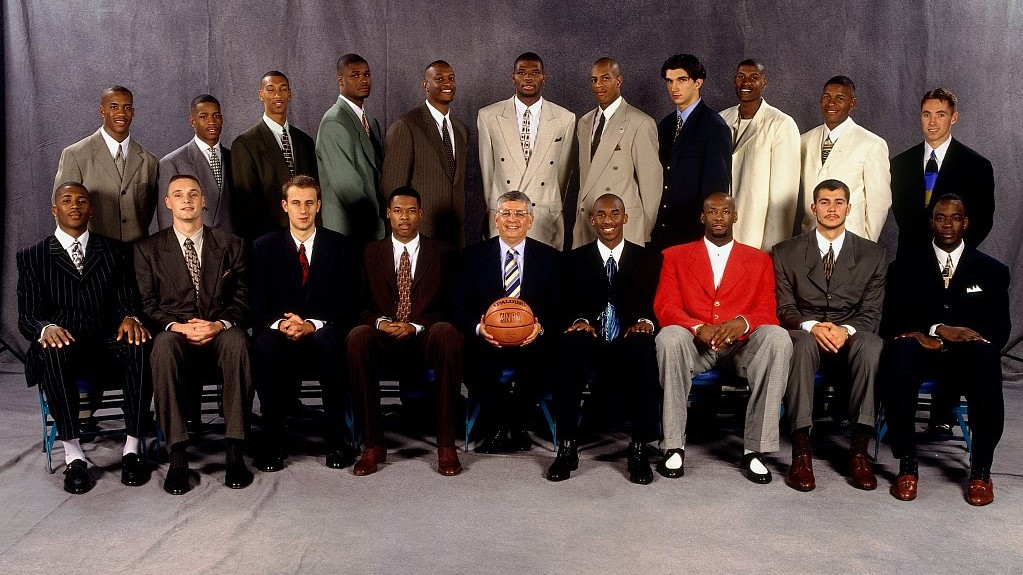
The Draftees pose for a group photo with NBA Commissioner David Stern (C) after they are selected in the first round of the NBA Draft at the Madison Square Garden in New York City, June 26, 1996. /VCG
The Draftees pose for a group photo with NBA Commissioner David Stern (C) after they are selected in the first round of the NBA Draft at the Madison Square Garden in New York City, June 26, 1996. /VCG
Meanwhile, the league was looking at a series of changes: the 1996 NBA Draft brought Allen Iverson, Marcus Camby, Ray Allen, Kobe Bryant, Steve Nash who would create their own eras in the future. The Atlanta Hawks signed Dikembe Mutombo with a five-year, 56-million-U.S.-dollar deal; Pat Riley of the Miami Heat gave Alonzo Mourning a seven-year, 100-million contract and tried to steal Juwan Howard from with the same deal from the Washington Bullets. The Los Angeles Lakers took advantage of the stupid front office of the Orlando Magic to land Shaquille O'Neal with a seven-year, 121-million-contract.
Nonetheless, the most exciting news was that Charles Barkley joined hands with Hakeem Olajuwon and Clyde Drexler in the Houston Rockets. Though all three were over 33 years old, just imagine, two future Hall of Famers who failed to win their title only because they lost to Jordan plus a top 3 center in NBA history who claimed back-to-back championships during the absence of Jordan, what kind of challenge would they pose to the Bulls?
That news did not seem to bother the Bulls much. Their substitutional center Bill Wennington believed that as long as they play their own game, the Bulls would win be the winners in the end.
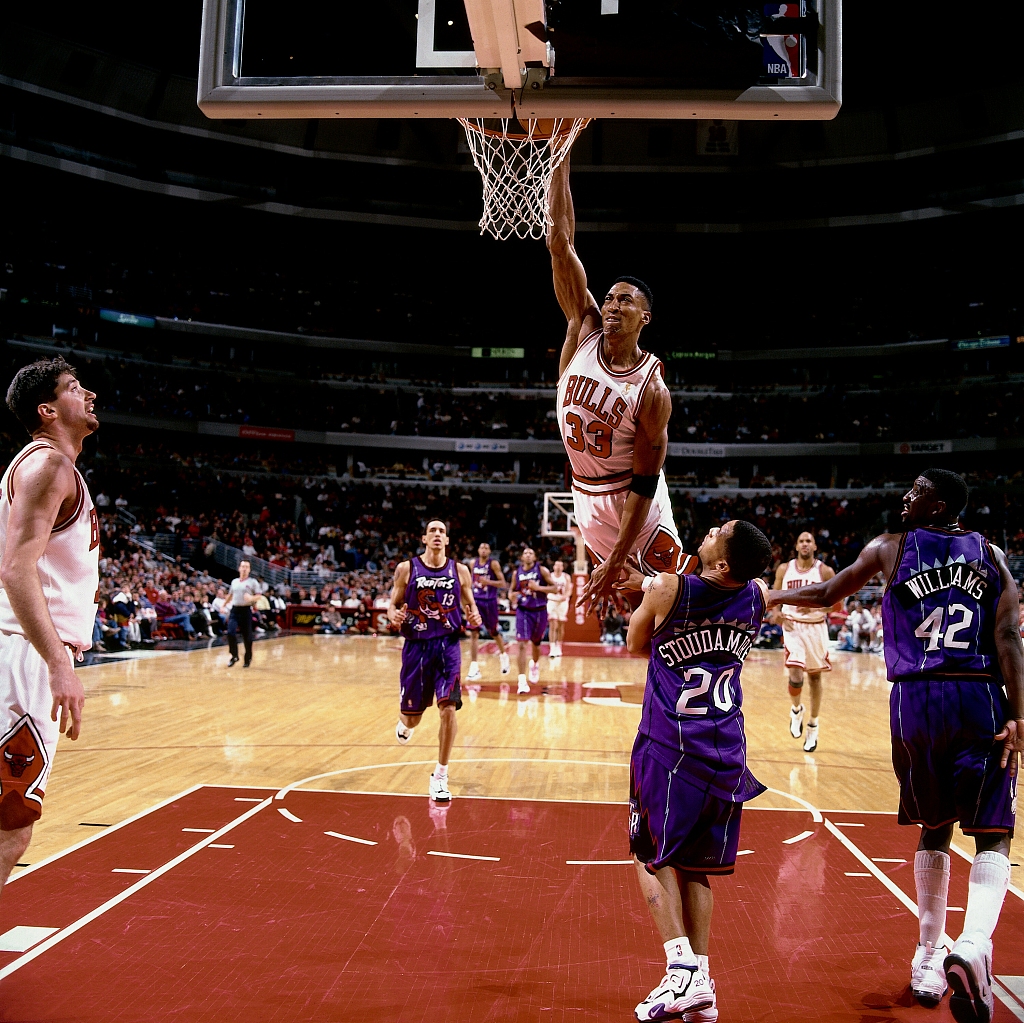
Scottie Pippen #33 of the Chicago Bulls dunks in the game against the Toronto Raptors at the United Center in Chicago, Illinois, 1997. /VCG
Scottie Pippen #33 of the Chicago Bulls dunks in the game against the Toronto Raptors at the United Center in Chicago, Illinois, 1997. /VCG
He was not wrong. Chicago started regular the season with 12 straight wins until they lost to the Utah Jazz 105-100. At the beginning, the press was still counting how many wins Chicago and Houston got. The latter once led 21-2 to 20-3, but the following four losses in a row made the press drop the comparison.
On April 19, Chicago finished the 1996-97 season with a 69-13 record. It did not seem as great as the last season, but the old men preferred to save strength for the playoffs in advance, which was likely why they lost three of the last four games. Rodman took his sixth rebounding title but missed 27 games; Scottie Pippen played all 82 games, was again named the All-Defensive First Team but watched third-year rookie Grant Hill take the All-NBA First Team spot from him; Jordan got his ninth scoring leader, was in both First Teams, but he was not the NBA MVP this time.
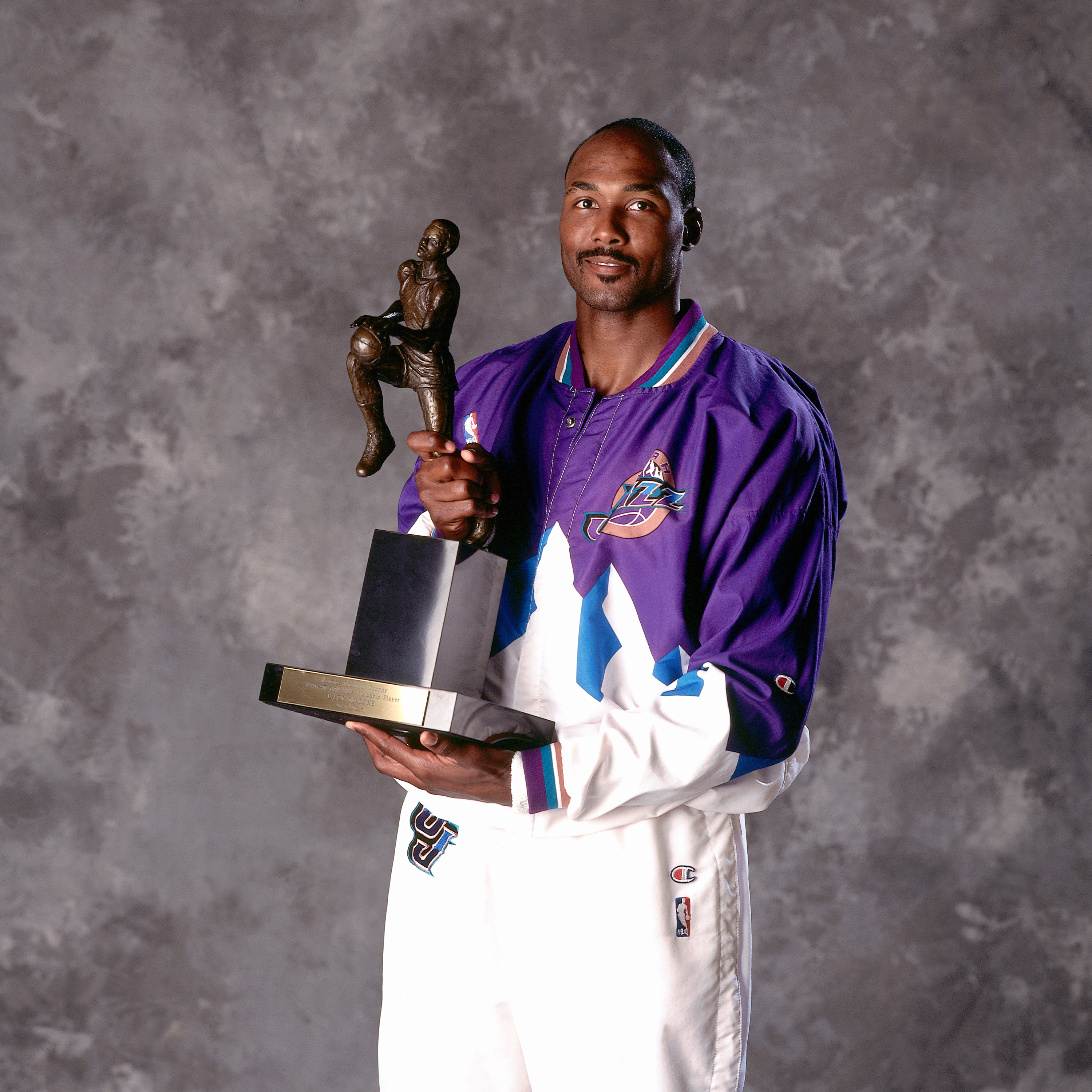
Karl Malone of the Utah Jazz holds the NBA Most Valuable Player trophy for a portrait in Salt Lake City, Utah, May, 1997. /VCG
Karl Malone of the Utah Jazz holds the NBA Most Valuable Player trophy for a portrait in Salt Lake City, Utah, May, 1997. /VCG
The award went to Karl Malone of the Jazz. Again, after 1993, another historic power forward beat Jordan in the MVP contest.
The Eastern teams could hardly challenge the Bulls in the playoffs. They only lost two games before eliminating the Bullets (3-0), the Hawks (4-1) and the Heat (4-1). However, it was not the Olajuwon, Drexler, Barkley and the Rockets that made the Finals from the West because they were knocked out by the Jazz, Malone, John Stockton and, coach Jerry Sloan.
As the first player who had the Bulls retire his No. 4 jersey, Sloan was known as "The Original Bull." He became the head coach of the Jazz in 1988 and spent the rest of his coach career with the team. He carved Stockton who looked more like a salary man than an NBA player into the NBA assists and steals leader. Under Sloan's instructions, Malone grew from a muscular forward to the future No. 2 on the list of NBA scoring leaders.
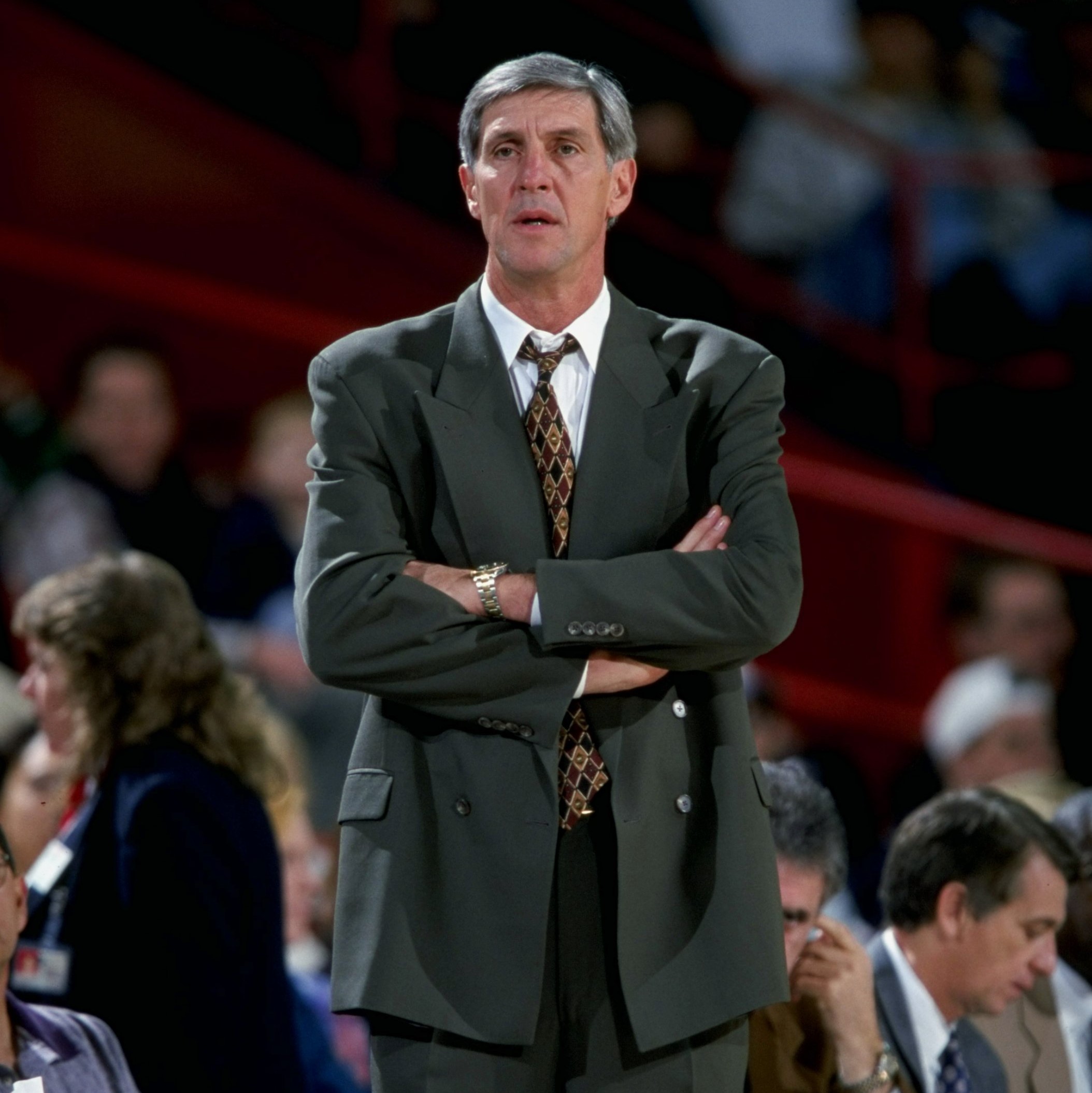
Jerry Sloan, head coach of the Utah Jazz. /VCG
Jerry Sloan, head coach of the Utah Jazz. /VCG
On June 1, 1997, the Jazz came to the United Center to challenge the defending champions. It was a tough game for both sides. Stockton got a double-double of 16 points, 12 assists but he also committed seven turnovers. Pippen went 11-19 and buried three sots from downtown but he also had six turnovers. Rodman had 12 rebounds but he found Malone difficult to defend. The Jazz lacked signature offensive trick except the screen plays between Stockton and Malone, but their solid defense and physical moves made the Bulls struggle, too.
When there were only nine seconds left, the game was an 82-82 tie. Malone was about to shoot two free throws before Pippen whispered to him: "The Mailman doesn't deliver on Sundays." June 1 in 1997 was a Sunday and Mailman was Malone's nickname.
Then Malone missed both attempts.
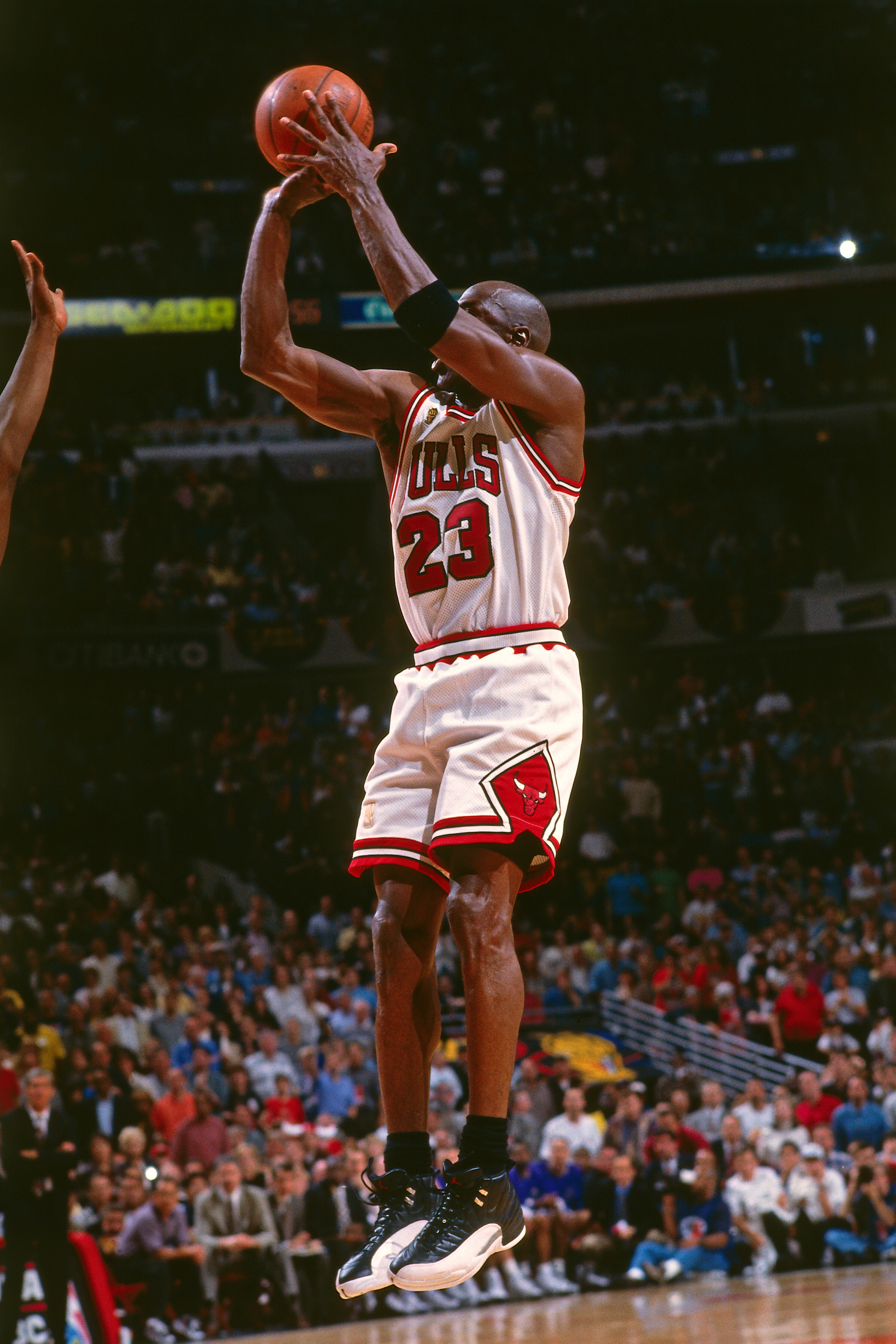
Michael Jordan of the Chicago Bulls shoots the ball in Game 1 of the NAB Finals against the Utah Jazz at the United Center, June 1, 1997. /VCG
Michael Jordan of the Chicago Bulls shoots the ball in Game 1 of the NAB Finals against the Utah Jazz at the United Center, June 1, 1997. /VCG
Jordan received the ball in the left wing, facing Bryon Russell hen there were seven seconds left. Jordan pretended to go right, but suddenly switched to left. He stepped into the 3-point line while Russell was still bending down, trying to stop him from penetrating. Then Jordan pulled up, beat the buzzer to take Game 1 for the Bulls 84-82.
Game 2 was much easier for the Bulls. Malone put down 20 points, 13 rebounds but he was struggling in field goals with 6-20. The rest of the team could not help him either. By contrast, Jordan scored 11 points in the first quarter and 20 in the first half, helping the Bulls lead 47-31 in the first half. The rest of the game became slow torture of the Jazz which ended losing 97-85.
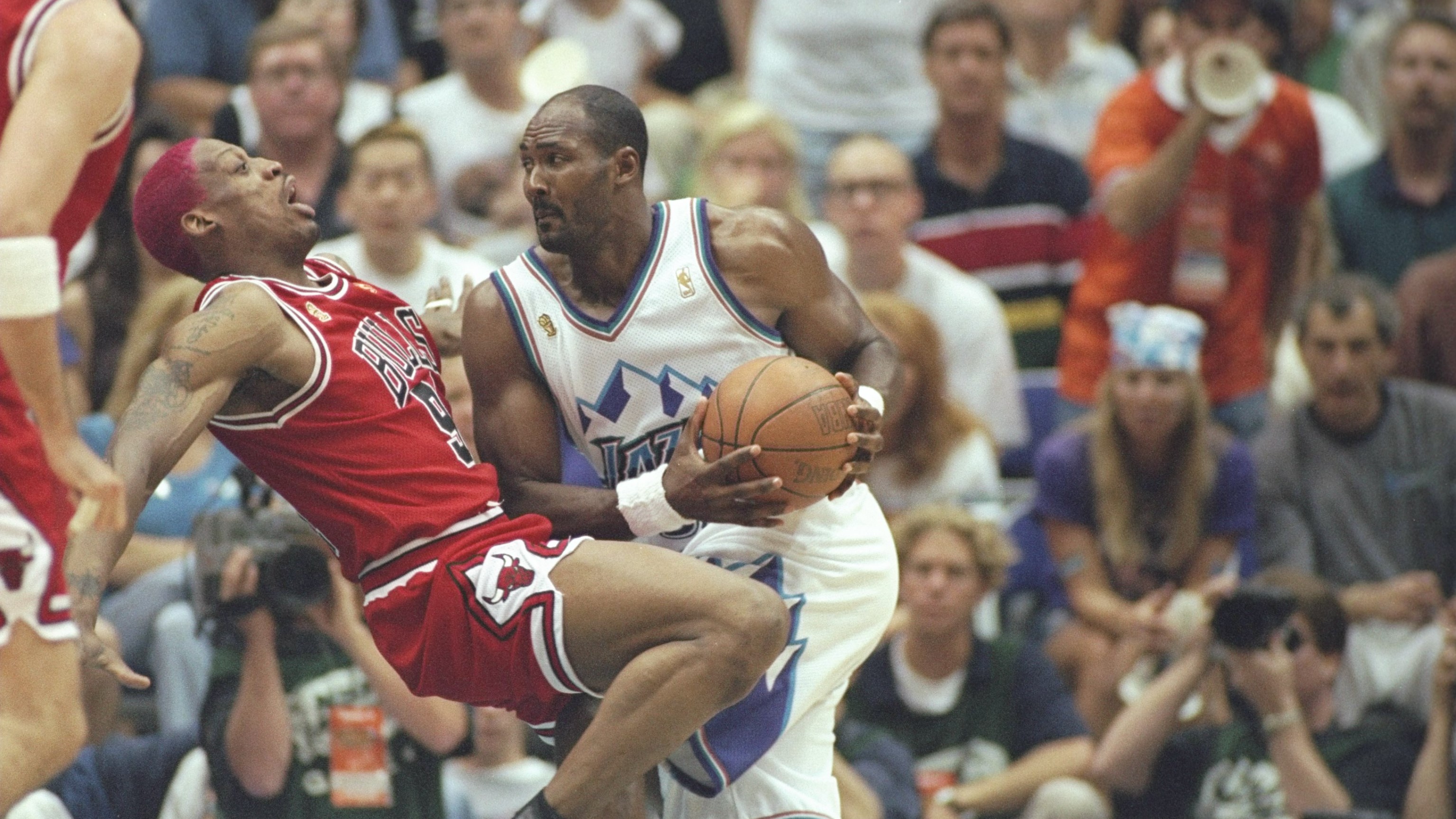
Karl Malone (R) of the Utah Jazz tries to break the defense by Dennis Rodman of the Chicago Bulls in Game 4 of the NBA Finals at the Delta Center, June 8, 1997. /VCG
Karl Malone (R) of the Utah Jazz tries to break the defense by Dennis Rodman of the Chicago Bulls in Game 4 of the NBA Finals at the Delta Center, June 8, 1997. /VCG
Game 3 happened at the Delta Center and things began to change. Chicago were on fire from the 3-point line (12-32) but only because Utah tried to double team everyone in the paint at any cost. Meanwhile, Malone dropped 37 points, 10 rebounds amid the cheering of local fans, making Rodman look like a broken puppet. 104-93, Utah took one game back.
Chicago in Game 4 again conducted their well-known baseline defensive trap while Jordan carried their offense. They led 71-66 when Jordan scored 12 of the team's 17 points in the last quarter.
However, this game belonged to Stockton. He first buried a valuable 3-pointer, just like the one that knocked out the Rockets in the Conference Finals. Then with a free throw and another jumper by him, Utah only trailed 73-72 in the last minute. Chicago missed their shot and Stockton got the ball. He delivered a 21-meter pass that found Malone who finished a lay up to help their team regain the lead 74-73. Chicago failed to score in the rest of the game. 78-73, the series was a 2-2 tie.
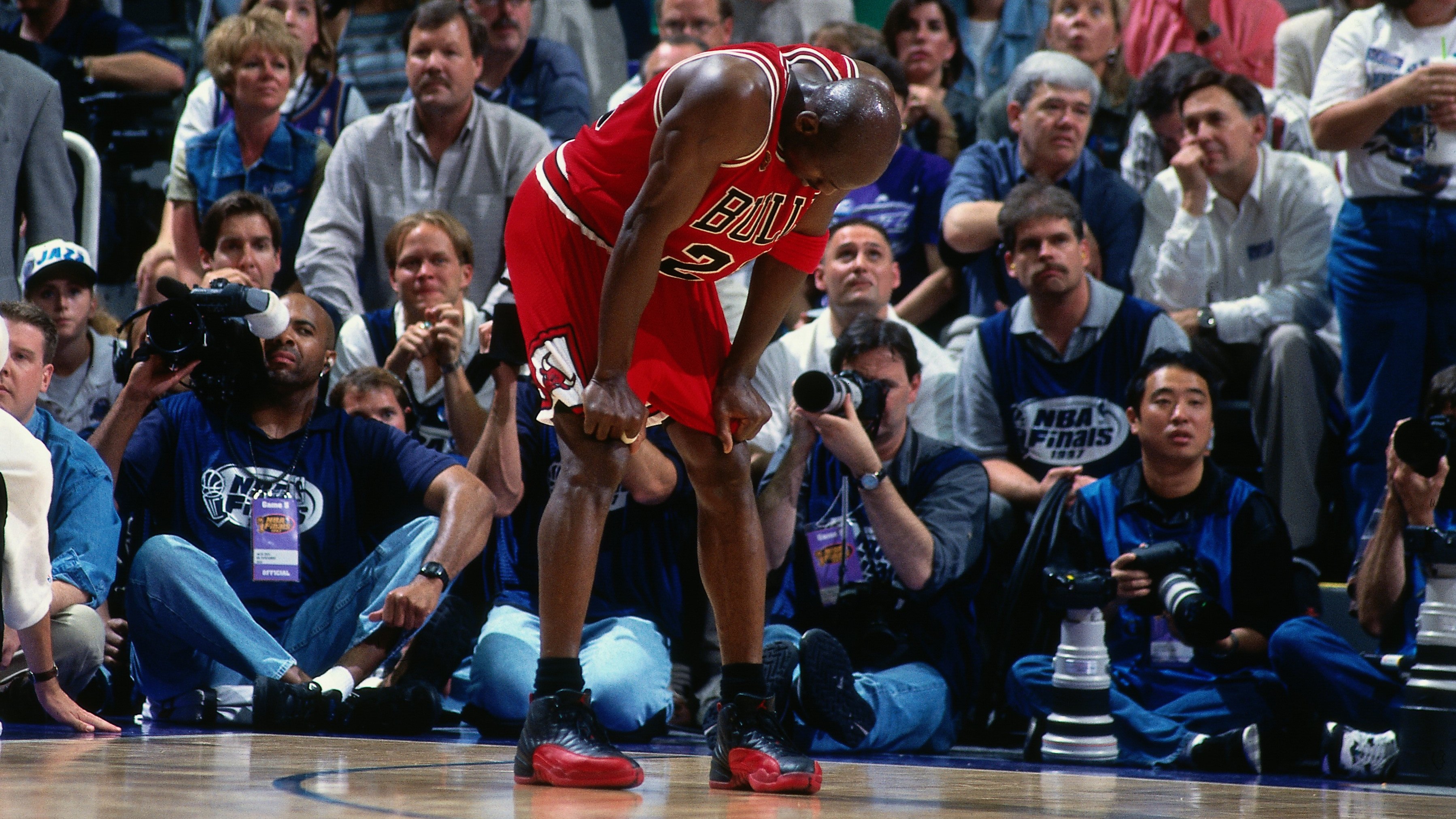
Michael Jordan of the Chicago Bulls looks uncomfortable in Game 5 of the NBA Finals against the Utah Jazz at the Delta Center, June 11, 1997. /VCG
Michael Jordan of the Chicago Bulls looks uncomfortable in Game 5 of the NBA Finals against the Utah Jazz at the Delta Center, June 11, 1997. /VCG
One of the greatest Finals performances was about happen at the Delta Center.
Before Game 5, Jordan ordered pizza in the hotel, ate it and got food-poisoning. He woke up at 3:00 a.m. and could not get back to sleep. In order to keep himself sober, he kept drinking coffee. He missed the practice that after noon. Coach Phil Jackson was even considering how to play the game without him.
Jordan decided to play, but his body seemed to disagree. His first attempt turned out to be an air ball and only got five points in the first quarter. Chicago trailed 29-16. Nonetheless, somehow Jordan still managed to take over in the second quarter. His shooting seemed soft but fell into the nets. He could not even run back to the half court but he kept drawing fouls and made nine out of 10 free throws. Jordan scored 17 points in this quarter and the Bulls narrowed the score difference down to 53-49.
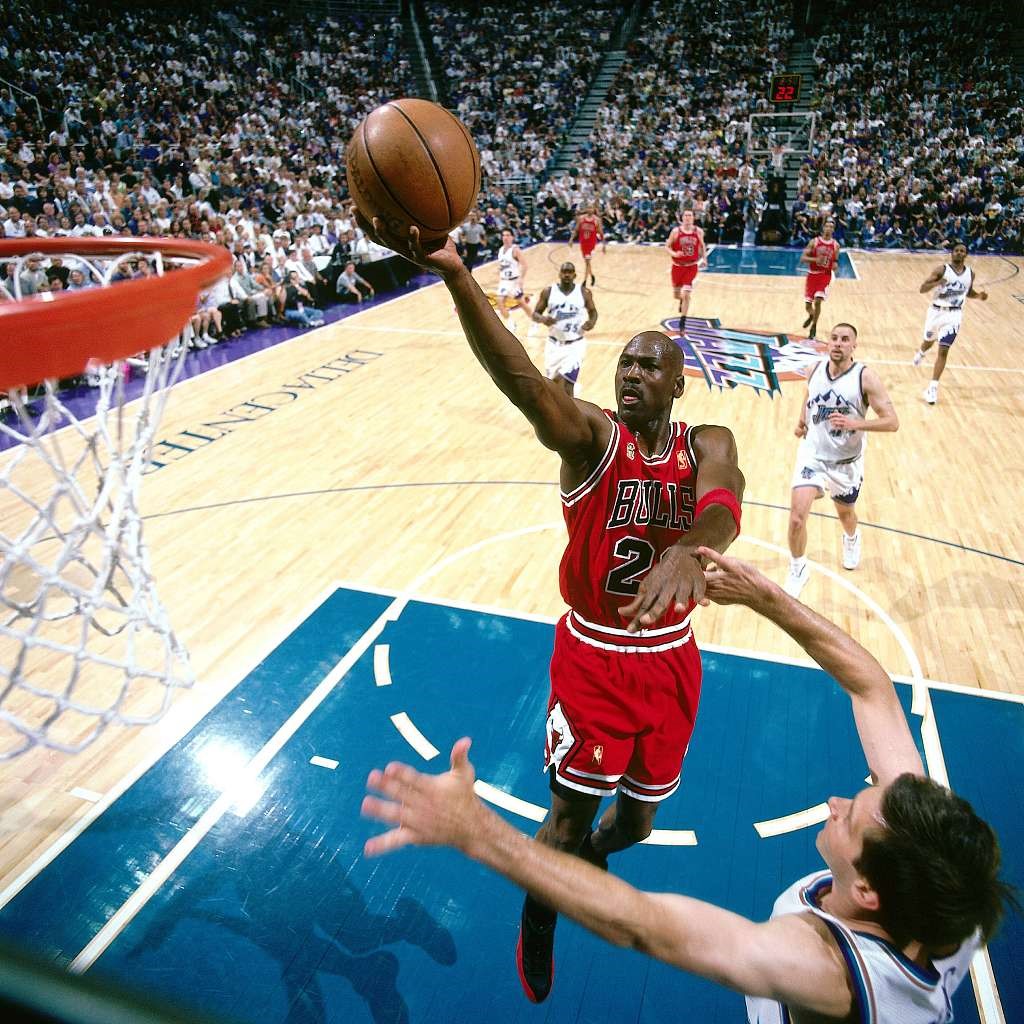
Michael Jordan #23 of the Chicago Bulls drives towards the rim in Game 5 of the NBA Finals against the Utah Jazz at the Delta Center, June 11, 1997. /VCG
Michael Jordan #23 of the Chicago Bulls drives towards the rim in Game 5 of the NBA Finals against the Utah Jazz at the Delta Center, June 11, 1997. /VCG
Jordan recalled that he was almost dehydrated at the halftime break. He drank a lot of water which soon came out as sweat. He tried drinking coffee again but that only made his dehydration worse. In the third quarter, he found it hard to even stay in the game and only got two points, but Chicago kept the game from being gone with their defense.
Then it was Jordan's time. Though he could not even sit straight on the bench, when he was back on the court. He kept making jumps from the left wing and from the middle during penetration. When there were only 47 seconds left, Chicago trailed 85-84. Jordan stood at the free throw line, he made the first one, missed the second one, but got the offensive rebound.
Pippen posted up against Jeff Hornacek, Jordan passed the ball to Pippen. Russel turned around to double team Pippen, but Stockton read Pippen's intention and ran to Jordan.
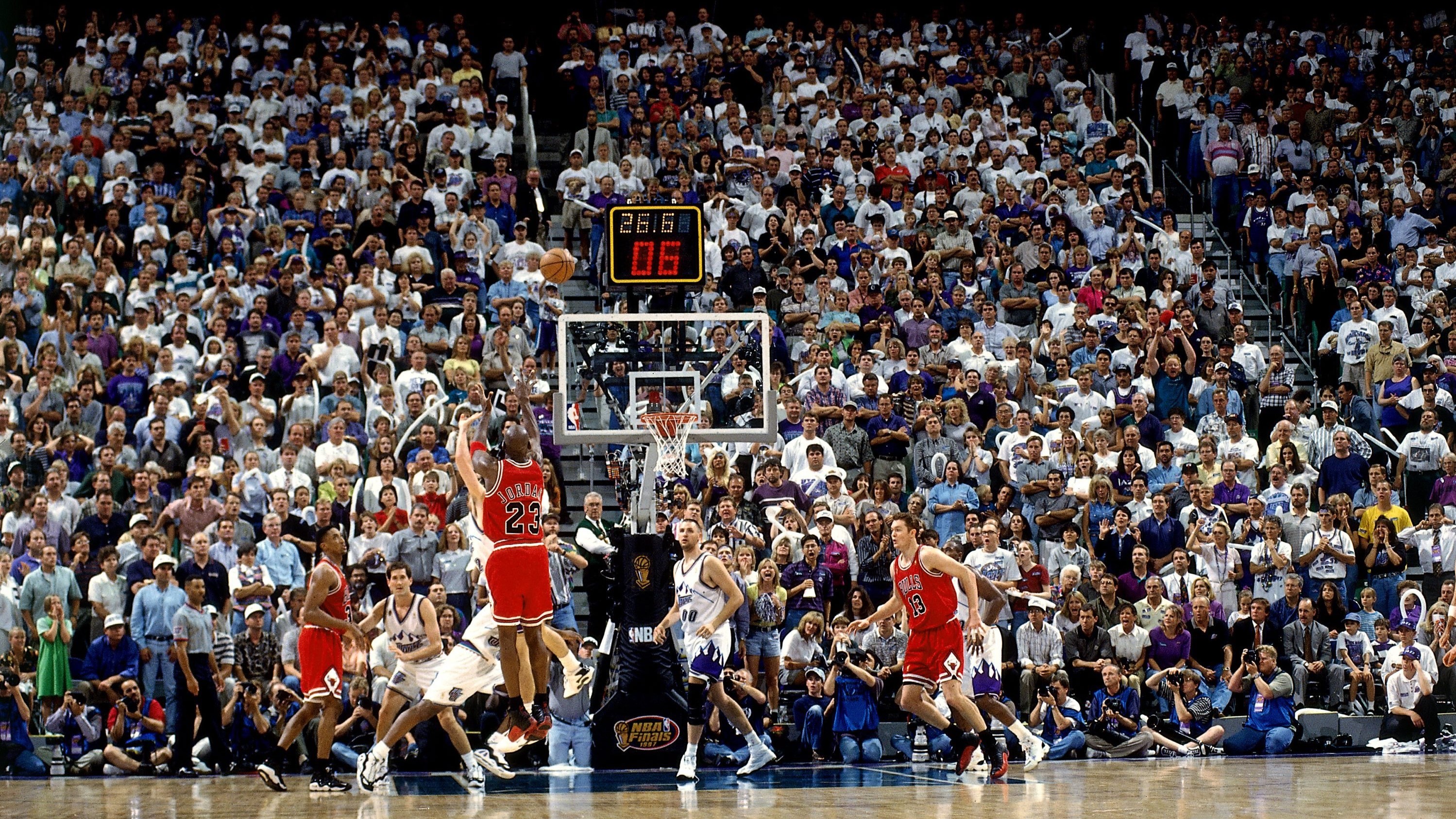
Michael Jordan #23 of the Chicago Bulls shoots the ball in Game 5 of the NBA Finals against the Utah Jazz at the Delta Center, June 11, 1997. /VCG
Michael Jordan #23 of the Chicago Bulls shoots the ball in Game 5 of the NBA Finals against the Utah Jazz at the Delta Center, June 11, 1997. /VCG
He was too late. Pippen passed the ball back to Jordan, who shot and made a 3-pointer. Chicago took the lead. Jordan walked back and did not celebrate, in fact, he did not even know if he made the shot. Luc Longley scored the last two points for Chicago. 90-88, Chicago won Game 5 and led 3-2.
Food-poisoned, 34-year Jordan played 44 minutes in this game to put down 38 points, seven rebounds, five assists and three steals. He could not even walk off the court by himself and missed the post-game press conference.
"Flu Game", that's how this was remembered by the world – yes, he was actually food-poisoned, but "Flu Game" just sounds so much cooler.
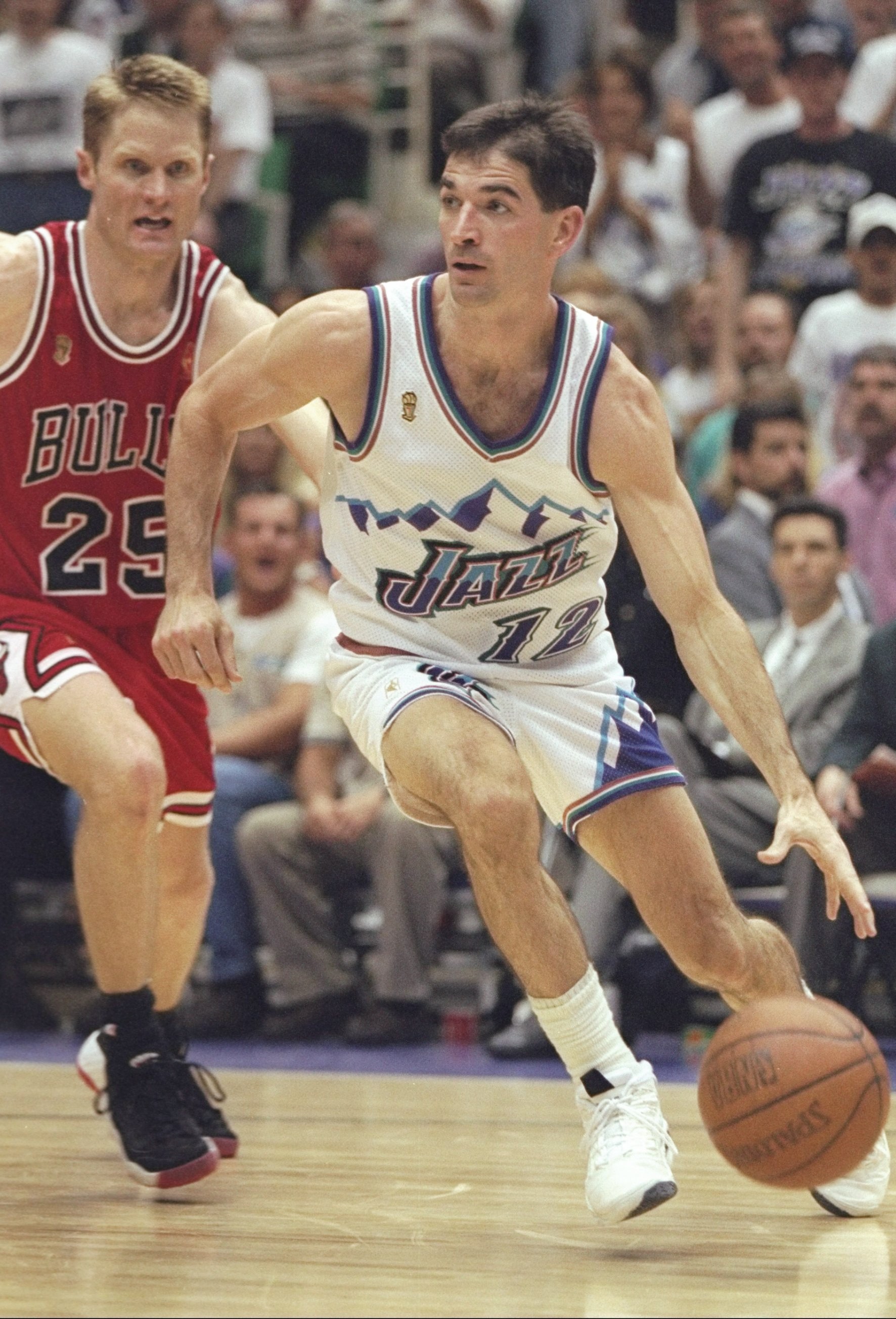
John Stockton #12 of the Utah Jazz handles the ball in Game 4 of the NBA Finals against the Chicago Bulls at the Delta Center, June 8, 1997. /VCG
John Stockton #12 of the Utah Jazz handles the ball in Game 4 of the NBA Finals against the Chicago Bulls at the Delta Center, June 8, 1997. /VCG
Game 6 was another bloody battle. Jordan only had four points in Q1 but he managed to shoot down 12 in Q2. Thanks to the Jazz remarkable defense, the Bulls' FG rate as a team was only 34 percent in the first half. The Jazz could have pocketed the win in the first half if their free throw shooting was a not disappointing 12-22.
Jordan's 13 points in Q3 kept the game a stalemate before the Bulls launched a 10-0 run in the last quarter. Malone and Jordan kept helping their teams exchange the lead. When there were 28 seconds left, the game was a tie.
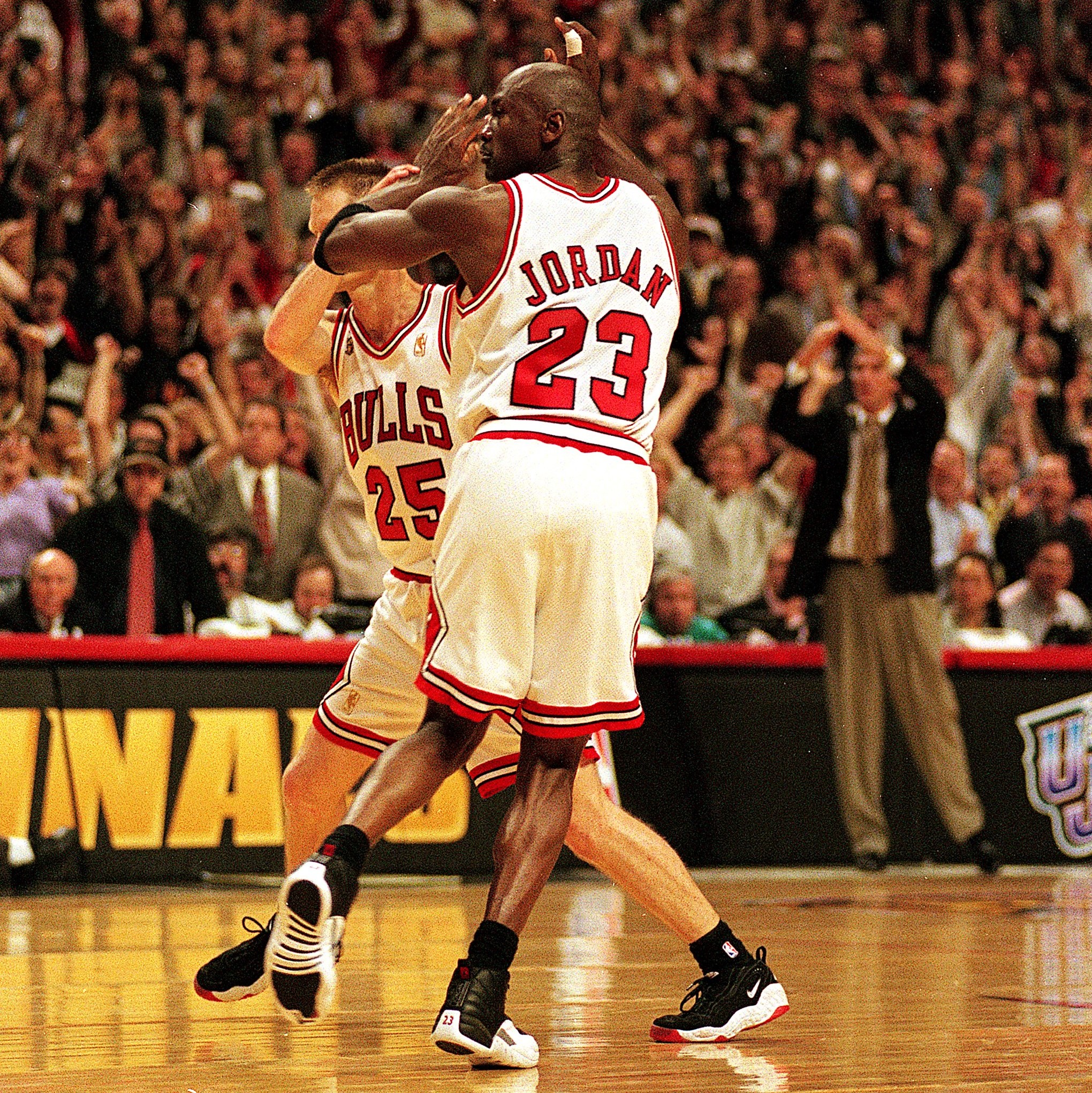
Michael Jordan #23 and Steve Kerr #25 of the Chicago Bulls celebrate after Kerr makes a junper in Game 6 of the NBA Finals against the Utah Jazz at the United Center, June 13, 1997. /VCG
Michael Jordan #23 and Steve Kerr #25 of the Chicago Bulls celebrate after Kerr makes a junper in Game 6 of the NBA Finals against the Utah Jazz at the United Center, June 13, 1997. /VCG
Jordan, who already scored 39 points, received the ball on the left. Stockton did not want him to repeat what happened in Game 1 and thus rushed to double team him. Then Jordan passed the ball his teammate.
31-year-old Steve Kerr, who kept a career-best FG rate of 53.3 percent that season, got the ball and he was open. Then he made a 17-foot jumper, 88-86, and the Bulls took the lead before Toni Kukoc sealed the game with a fast break dunk.
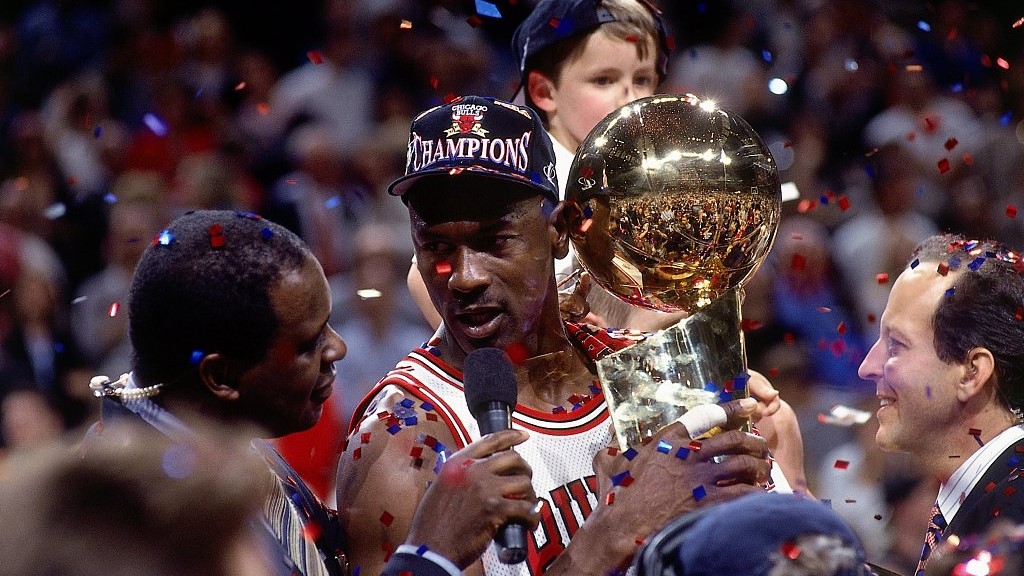
Michael Jordan of the Chicago Bulls celebrates with the Larry O'Brien NBA Championship Trophy after Game 6 of the NBA Finals against the Utah Jazz at the United Center, June 13, 1997. /VCG
Michael Jordan of the Chicago Bulls celebrates with the Larry O'Brien NBA Championship Trophy after Game 6 of the NBA Finals against the Utah Jazz at the United Center, June 13, 1997. /VCG
4-2, Jordan and the Bulls won their fifth NBA championship. Of course, their journey was a season away from ending. The Jazz again waited for them in next year's Finals, where Jordan was about put up the greatest performance in NBA Finals history.